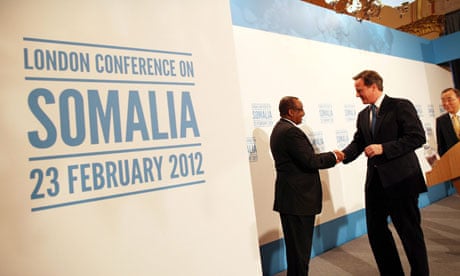World leaders have pledged more help to combat terrorism and piracy in Somalia, but demanded that its politicians form a stable government and backed this up with a threat of sanctions against anyone deemed to be stalling progress.
The conference in London issued a joint statement calling for the dissolution of the weak transitional government that holds power in Mogadishu and in a limited amount of territory outside the capital, with the help of African Union and Ethiopian troops.
The communique said the transitional government must make way by August for a more representative replacement. "There must be must be no further extensions," the statement said. "We welcomed the agreements that chart the way towards more representative government."
The conference brought together 55 nations and international organisations, with the UN-backed transitional government, US secretary of state Hillary Clinton, and UN secretary general Ban Ki-moon.
"For two decades Somalia has been torn apart by famine, bloodshed and some of the worst poverty on Earth," David Cameron told the meeting. "If the rest of us just sit back and look on, we will pay a price for doing so."
Some advocacy groups criticised the conference's outcome as the latest in a series of imposed solutions that consequently was destined to fail.
"We anticipated the conference would offer hope to the millions of people hit by drought and conflict, and support to build a peace process that included a wide section of Somali society," said Barbara Stocking, chief executive of Oxfam. "What we got was the rhetoric of Somali inclusion but you cannot go forward with a new constitution and elections in such a troubled country without a wide and inclusive political engagement within Somali society."
However, Sally Healy, an expert on the Horn of Africa, argued the conference's prescriptions had been left vague enough for Somalis to shape their own form of government, and she downplayed fears of a power vacuum.
"What do you think there is now?" she asked. "I'm delighted that it doesn't prescribe anything firm to follow the transitional government. It creates an opportunity for Somalis to occupy a political space and come up with their own political processes."
Healy also welcomed the UN security council's decision to strengthen the AU force, Amisom, from 12,000 to more than 17,000. Its job now, she said, would be to build up the Somali security forces. Amisom has pushed al-Shabaab, the Islamists who have formally aligned themselves to al-Qaida, out of Mogadishu and out of the central city of Baidoa, but humanitarian groups say the military campaigns have made more difficult their task of helping the 2.3 million people still in need of food aid and shelter.
Kristalina Georgieva, EU commissioner for humanitarian affairs, said that humanitarian groups had found themselves having to deal with "multiple command points and local chiefs" in areas liberated by Amisom forces. "Their work has become difficult," said Georgieva, who attended the humanitarian component of the conference, adding that "military pressure has united and hardened al-Shabaab".
At the concluding press conference, Somalia's prime minister again said that he would welcome "targeted" air strikes against al-Qaida. Abdiweli Mohamed Ali told journalists that al-Shabaab was a "global problem, and it needs to be addressed globally".
Cameron sidestepped questions as to whether Britain would launch air strikes against al-Shabaab training camps. Somalia's future depends on a political process, he responded. Clinton also played down the idea of air strikes saying they would not be a good idea.
Cameron described Somalia as being a "complex jigsaw puzzle" and warned there was "no single solution" for restoring stability. But he said the talks were the next stage in what was a "long journey" but provided a "very real opportunity" for change.




